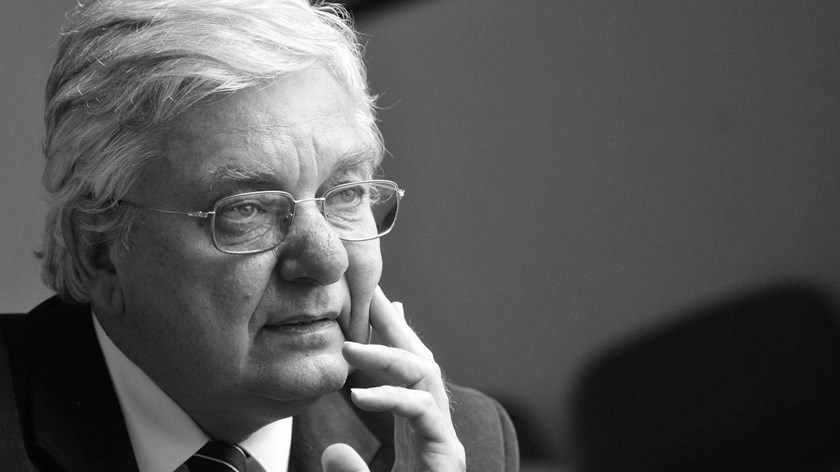Friends of Hungary Foundation Member Miklós Duray Passes Away

On December 30, 2022, at the age of 77, after a long illness, Miklós Duray, Hungarian politician, writer, university professor from Slovakia, and one of the most influential figures in the Hungarian minority community since the WWII era, politician János Esterházy passed away, reads a statement on Felvidék.ma.
Miklós Duray was born on July 18, 1945 in Lučenec (Losonc), Slovakia, into a rather colorful family. The Duray branch of the family has French Huguenot ancestry, its female branch is partly of Welser German bourgeois descent (Philipphine Welser was the wife of Ferdinand II, Archduke of Austria,) and also has Wertheimer German-Jewish roots. On Duray’s mother’s side of the family, German and Slovakian roots can be traced.
He studied geology at the Faculty of Natural Sciences of the Komensky (Commenius) University in Bratislava, then obtained a doctorate in geochemistry. From 1963, he was active in public and political life in Hungarian youth organizations in Czechoslovakia, independent of the official authorities.
He became a member of the Hungarian Workers’ Cultural Association of Czechoslovakia (Csemadok), controlled by the communist party, in 1963, a member of the Central Committee of Csemadok from 1966.
Miklós Duray was one of the initiators of the Hungarian youth conference created as a result of the Prague Spring of 1968, at which it was decided to establish the Hungarian Youth Association.
Together with his colleagues, he founded the Hungarian Youth Association of Czechoslovakia in 1968, of which he was the general secretary and, from December 1968, its president. The organization ceased to exist in November 1969, as the newly established Slovak Ministry of the Interior did not authorize its operation.
In 1971, he was included on the ‘black list’ established by the Presidium of the Central Committee of the Communist Party of Czechoslovakia.
He was expelled from the organization for political reasons, and could not publish or participate in public life.
He rejoined public life in 1976, giving lectures to Hungarian university students in Hungary and Slovakia. He confronted the Hungarian intellectuals in Slovakia who signed the declaration organized by the central government against Charter ’77.
In spite of the challenges, he never stopped: in 1978, he founded the Committee for the Protection of the Rights of the Hungarian Minority in Czechoslovakia. In the 1980s, he was observed and harassed by the state police, interrogated, searched, and prevented from traveling abroad. He was arrested twice, held on remand, and even in Ottawa thousands demonstrated to stop the trial against him. He was held without trial for a total of 470 days.
From 1990, Miklós Duray became a professional politician, founded the political organization of ethnic groups in Czechoslovakia, the Coexistence (Együttélés) political movement, following the example of Count János Esterházy, and became a member of parliament in Czechoslovakia. He was re-elected in 1992. He was the president of the parliamentary faction of the Hungarian Coalition from 1994 to 1996.
He became interested in Hungarian national politics and national strategy. Later, after the break-up of Czechoslovakia in 1993, he became a member of the Slovak National Council and he is credited with the formulation of the system of joint national guardianship and partnership over Slovakia between Slovaks and the Hungarian minority.
Duray also helped Hungarian politics, for example, by facilitating the formation of an alliance between the Hungarian right-wing parliamentary parties in the 1990s, including the now ruling Fidesz and KDNP, by giving them the opportunity to appear abroad and hold political talks in Slovakia.
In 1998, he was one of the initiators of the idea of the Hungarian Permanent Conference (MÁÉRT) concerning Hungarian minorities.
Later, he was a permanent representative of the Hungarian Coalition Party, a merger of the three Hungarian parties in Slovakia. Since its foundation in 2004, he has been actively involved in the work of the Forum of Hungarian Representatives of the Carpathian Basin, which operates within the Hungarian Parliament. The importance of his work is reflected in the fact that he was the first initiator of the law on Hungarians living in neighboring states of Hungary and the idea of the Hungarian identity card system. After the adoption of the law, he became the holder of the Hungarian identity card number 1.
He ended his active political career in 2010, after which he started teaching at the University of Western Hungary in Sopron, where his lectures focused on national politics and the development of the Hungarian nation, which was divided by state borders. In 2012, he also started a course on national studies at the National University of Public Service.
He wrote several books, and published articles in daily and weekly newspapers, as well as periodicals.
He was also a member of the Friends of Hungary Foundation, was the recipient of the Grand Cross of the Order of Merit of the Republic of Hungary and was presented with the Award for a Civic Hungary in 2011.